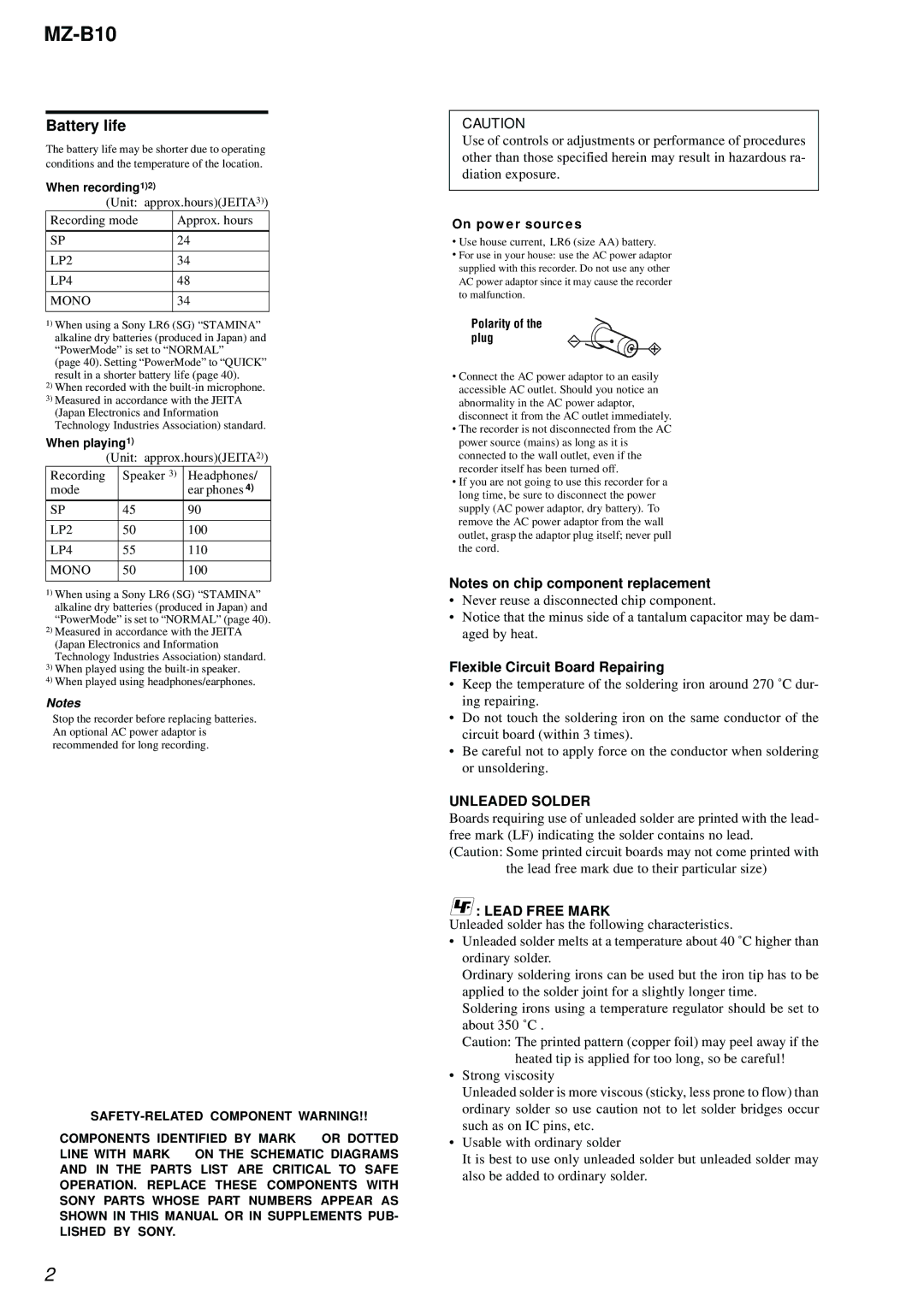
MZ-B10
Battery life
The battery life may be shorter due to operating conditions and the temperature of the location.
When recording1)2)
(Unit: | approx.hours)(JEITA3)) | |
Recording mode |
| Approx. hours |
|
|
|
SP |
| 24 |
|
|
|
LP2 |
| 34 |
|
|
|
LP4 |
| 48 |
|
|
|
MONO |
| 34 |
|
|
|
1)When using a Sony LR6 (SG) “STAMINA” alkaline dry batteries (produced in Japan) and “PowerMode” is set to “NORMAL”
(page 40). Setting “PowerMode” to “QUICK” result in a shorter battery life (page 40).
2)When recorded with the
3)Measured in accordance with the JEITA (Japan Electronics and Information Technology Industries Association) standard.
When playing1)
(Unit: approx.hours)(JEITA2))
Recording | Speaker3) | Headphones/ |
mode |
| earphones4) |
SP | 45 | 90 |
|
|
|
LP2 | 50 | 100 |
|
|
|
LP4 | 55 | 110 |
|
|
|
MONO | 50 | 100 |
|
|
|
1)When using a Sony LR6 (SG) “STAMINA” alkaline dry batteries (produced in Japan) and “PowerMode” is set to “NORMAL” (page 40).
2)Measured in accordance with the JEITA (Japan Electronics and Information Technology Industries Association) standard.
3)When played using the
4)When played using headphones/earphones.
Notes
Stop the recorder before replacing batteries. An optional AC power adaptor is recommended for long recording.
COMPONENTS IDENTIFIED BY MARK 0 OR DOTTED LINE WITH MARK 0 ON THE SCHEMATIC DIAGRAMS
AND IN THE PARTS LIST ARE CRITICAL TO SAFE OPERATION. REPLACE THESE COMPONENTS WITH SONY PARTS WHOSE PART NUMBERS APPEAR AS SHOWN IN THIS MANUAL OR IN SUPPLEMENTS PUB- LISHED BY SONY.
CAUTION
Use of controls or adjustments or performance of procedures other than those specified herein may result in hazardous ra- diation exposure.
On power sources
•Use house current, LR6 (size AA) battery.
•For use in your house: use the AC power adaptor supplied with this recorder. Do not use any other AC power adaptor since it may cause the recorder to malfunction.
Polarity of the plug
•Connect the AC power adaptor to an easily accessible AC outlet. Should you notice an abnormality in the AC power adaptor, disconnect it from the AC outlet immediately.
•The recorder is not disconnected from the AC power source (mains) as long as it is connected to the wall outlet, even if the recorder itself has been turned off.
•If you are not going to use this recorder for a long time, be sure to disconnect the power supply (AC power adaptor, dry battery). To remove the AC power adaptor from the wall outlet, grasp the adaptor plug itself; never pull the cord.
Notes on chip component replacement
•Never reuse a disconnected chip component.
•Notice that the minus side of a tantalum capacitor may be dam- aged by heat.
Flexible Circuit Board Repairing
•Keep the temperature of the soldering iron around 270 ˚C dur- ing repairing.
•Do not touch the soldering iron on the same conductor of the circuit board (within 3 times).
•Be careful not to apply force on the conductor when soldering or unsoldering.
UNLEADED SOLDER
Boards requiring use of unleaded solder are printed with the lead- free mark (LF) indicating the solder contains no lead.
(Caution: Some printed circuit boards may not come printed with the lead free mark due to their particular size)
 : LEAD FREE MARK
: LEAD FREE MARK
Unleaded solder has the following characteristics.
•Unleaded solder melts at a temperature about 40 ˚C higher than ordinary solder.
Ordinary soldering irons can be used but the iron tip has to be applied to the solder joint for a slightly longer time.
Soldering irons using a temperature regulator should be set to about 350 ˚C .
Caution: The printed pattern (copper foil) may peel away if the heated tip is applied for too long, so be careful!
•Strong viscosity
Unleaded solder is more viscous (sticky, less prone to flow) than ordinary solder so use caution not to let solder bridges occur such as on IC pins, etc.
•Usable with ordinary solder
It is best to use only unleaded solder but unleaded solder may also be added to ordinary solder.
2
